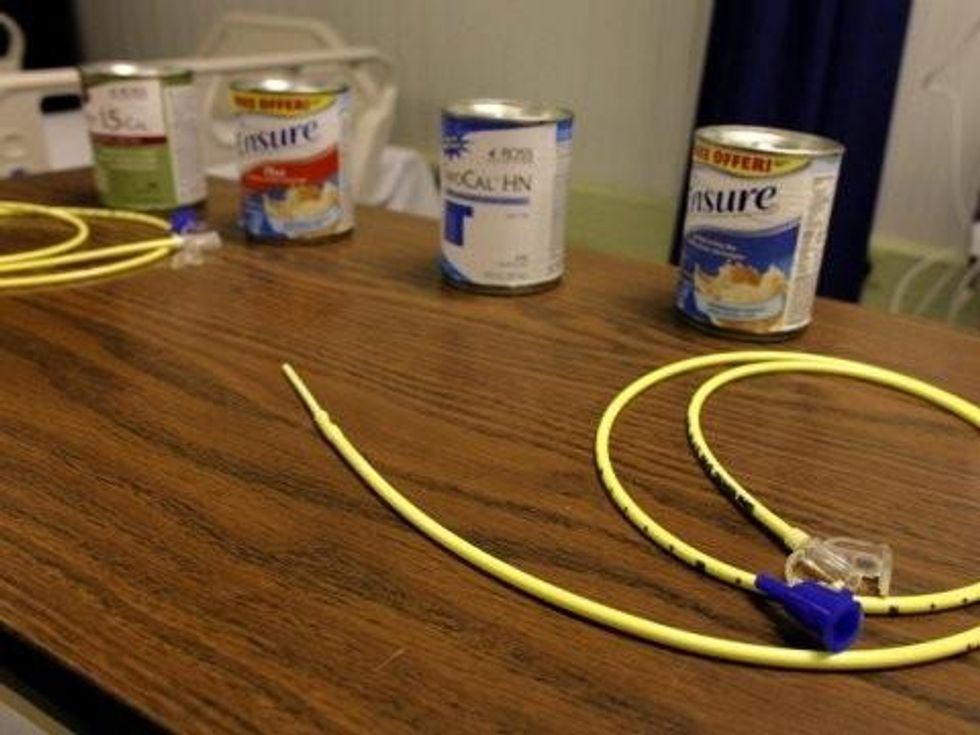Calif. Prisons Given Go-Ahead to Force-Feed Inmates on Hunger Strike
Critics condemn the practice, also used against Guantanamo Bay hunger strikers, as a gross violation of human rights

"This [court decision] violates all international laws and standards and gives the medical director of each prison authority to violate human rights laws instead of reasonably negotiating with prisoners," declared Claude Marks of the Prisoner Hunger Strike Solidarity Coalition.

The ruling, passed by U.S. District Court Judge Thelton E. Henderson in response to requests from state authorities, contradicts a California state law explicitly prohibiting force-feedings for prisoners who signed orders that they be allowed to die.
State officials argued in the courts that prisoners signed the papers under coercion by what they allege is gang control, and the judge acquiesced, ruling that the "do not resuscitate" orders no longer have legal standing.
Prisoners and their allies charge that unproven claims of gang coercion are levied by prison authorities in attempt to break the hunger strike, dehumanize inmates and justify cruel collective punishment.
"CDCR's [the California Department of Corrections and Rehabilitation's] approach is hopeless and dangerous," declared Azadeh Zohrabi, spokesperson for the Prisoner Hunger Strike Solidarity Coalition. "It perpetuates a logic that says it is okay to torture someone based on their criminal convictions. It creates prison conditions that destroy people physically and mentally, and arbitrarily metes out punishment that exceeds any sentences passed down by the courts."
Human rights advocates slammed the practice of force-feeding that has been condemned as a violation of international law by subjecting inmates to cruel and torturous punishment. The process involves "snaking feeding tubes through inmates' noses and into their stomachs," the AP reports.
"Force-feeding violates international law to the extent that it involves somebody who doesn't give their consent," declared Jules Lobel, president of the Center for Constitutional Rights, who represents 10 inmates suing to end prolonged solitary confinement at Pelican Bay State Prison.
The issue was thrust into the media spotlight due to the the controversial and widely condemned force-feeding of Guantanamo Bay inmates on hunger strike. "This approach [in California], much like Guantanamo, sets the U.S. apart from all related international human rights standards," Marks declared.
There is no data on rates of force-feedings in U.S. prisons, but this is not the first time U.S. courts have intervened to give the go-ahead for the controversial practice.
While the number of hunger striking prisoners is consistently under-counted, the media is widely reporting that at least 69 inmates have consistently gone without food since the California prison hunger strikes were launched July 8.
In the third major prisoner hunger strike in the state since 2011, prisoners are demanding an end to solitary confinement, as well as a halt to collective punishments, harsh crackdowns under the auspices of 'stopping gang activities,' and access to education, healthcare and healthy food.
_____________________
An Urgent Message From Our Co-Founder
Dear Common Dreams reader, The U.S. is on a fast track to authoritarianism like nothing I've ever seen. Meanwhile, corporate news outlets are utterly capitulating to Trump, twisting their coverage to avoid drawing his ire while lining up to stuff cash in his pockets. That's why I believe that Common Dreams is doing the best and most consequential reporting that we've ever done. Our small but mighty team is a progressive reporting powerhouse, covering the news every day that the corporate media never will. Our mission has always been simple: To inform. To inspire. And to ignite change for the common good. Now here's the key piece that I want all our readers to understand: None of this would be possible without your financial support. That's not just some fundraising cliche. It's the absolute and literal truth. We don't accept corporate advertising and never will. We don't have a paywall because we don't think people should be blocked from critical news based on their ability to pay. Everything we do is funded by the donations of readers like you. Will you donate now to help power the nonprofit, independent reporting of Common Dreams? Thank you for being a vital member of our community. Together, we can keep independent journalism alive when it’s needed most. - Craig Brown, Co-founder |

"This [court decision] violates all international laws and standards and gives the medical director of each prison authority to violate human rights laws instead of reasonably negotiating with prisoners," declared Claude Marks of the Prisoner Hunger Strike Solidarity Coalition.

The ruling, passed by U.S. District Court Judge Thelton E. Henderson in response to requests from state authorities, contradicts a California state law explicitly prohibiting force-feedings for prisoners who signed orders that they be allowed to die.
State officials argued in the courts that prisoners signed the papers under coercion by what they allege is gang control, and the judge acquiesced, ruling that the "do not resuscitate" orders no longer have legal standing.
Prisoners and their allies charge that unproven claims of gang coercion are levied by prison authorities in attempt to break the hunger strike, dehumanize inmates and justify cruel collective punishment.
"CDCR's [the California Department of Corrections and Rehabilitation's] approach is hopeless and dangerous," declared Azadeh Zohrabi, spokesperson for the Prisoner Hunger Strike Solidarity Coalition. "It perpetuates a logic that says it is okay to torture someone based on their criminal convictions. It creates prison conditions that destroy people physically and mentally, and arbitrarily metes out punishment that exceeds any sentences passed down by the courts."
Human rights advocates slammed the practice of force-feeding that has been condemned as a violation of international law by subjecting inmates to cruel and torturous punishment. The process involves "snaking feeding tubes through inmates' noses and into their stomachs," the AP reports.
"Force-feeding violates international law to the extent that it involves somebody who doesn't give their consent," declared Jules Lobel, president of the Center for Constitutional Rights, who represents 10 inmates suing to end prolonged solitary confinement at Pelican Bay State Prison.
The issue was thrust into the media spotlight due to the the controversial and widely condemned force-feeding of Guantanamo Bay inmates on hunger strike. "This approach [in California], much like Guantanamo, sets the U.S. apart from all related international human rights standards," Marks declared.
There is no data on rates of force-feedings in U.S. prisons, but this is not the first time U.S. courts have intervened to give the go-ahead for the controversial practice.
While the number of hunger striking prisoners is consistently under-counted, the media is widely reporting that at least 69 inmates have consistently gone without food since the California prison hunger strikes were launched July 8.
In the third major prisoner hunger strike in the state since 2011, prisoners are demanding an end to solitary confinement, as well as a halt to collective punishments, harsh crackdowns under the auspices of 'stopping gang activities,' and access to education, healthcare and healthy food.
_____________________

"This [court decision] violates all international laws and standards and gives the medical director of each prison authority to violate human rights laws instead of reasonably negotiating with prisoners," declared Claude Marks of the Prisoner Hunger Strike Solidarity Coalition.

The ruling, passed by U.S. District Court Judge Thelton E. Henderson in response to requests from state authorities, contradicts a California state law explicitly prohibiting force-feedings for prisoners who signed orders that they be allowed to die.
State officials argued in the courts that prisoners signed the papers under coercion by what they allege is gang control, and the judge acquiesced, ruling that the "do not resuscitate" orders no longer have legal standing.
Prisoners and their allies charge that unproven claims of gang coercion are levied by prison authorities in attempt to break the hunger strike, dehumanize inmates and justify cruel collective punishment.
"CDCR's [the California Department of Corrections and Rehabilitation's] approach is hopeless and dangerous," declared Azadeh Zohrabi, spokesperson for the Prisoner Hunger Strike Solidarity Coalition. "It perpetuates a logic that says it is okay to torture someone based on their criminal convictions. It creates prison conditions that destroy people physically and mentally, and arbitrarily metes out punishment that exceeds any sentences passed down by the courts."
Human rights advocates slammed the practice of force-feeding that has been condemned as a violation of international law by subjecting inmates to cruel and torturous punishment. The process involves "snaking feeding tubes through inmates' noses and into their stomachs," the AP reports.
"Force-feeding violates international law to the extent that it involves somebody who doesn't give their consent," declared Jules Lobel, president of the Center for Constitutional Rights, who represents 10 inmates suing to end prolonged solitary confinement at Pelican Bay State Prison.
The issue was thrust into the media spotlight due to the the controversial and widely condemned force-feeding of Guantanamo Bay inmates on hunger strike. "This approach [in California], much like Guantanamo, sets the U.S. apart from all related international human rights standards," Marks declared.
There is no data on rates of force-feedings in U.S. prisons, but this is not the first time U.S. courts have intervened to give the go-ahead for the controversial practice.
While the number of hunger striking prisoners is consistently under-counted, the media is widely reporting that at least 69 inmates have consistently gone without food since the California prison hunger strikes were launched July 8.
In the third major prisoner hunger strike in the state since 2011, prisoners are demanding an end to solitary confinement, as well as a halt to collective punishments, harsh crackdowns under the auspices of 'stopping gang activities,' and access to education, healthcare and healthy food.
_____________________

